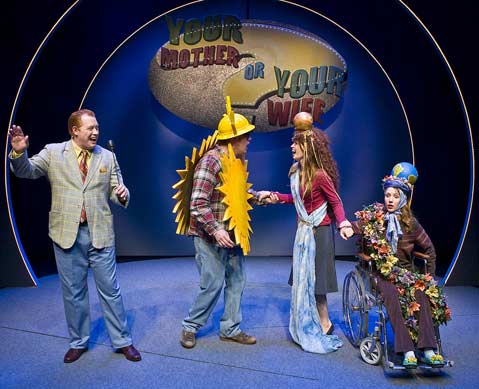Reckless at UCSB’s Performing Arts Theatre
November 7 Performance of Reckless at UCSB's Performing Arts Theatre Reviewed

Nat King Cole’s voice croons as blue light illuminates the bedroom window and snow falls softly on Christmas Eve. Reckless opens to this picture-perfect idyll, which is completed by the euphoria of protagonist Rachel (Christy Escobar). But when her husband announces that he has taken out a contract on her life, the question “do you really know the people closest to you?” arises as she leaps out of the window to escape. Throughout Rachel’s nightmarish journey, which is filled with coincidences, surprises, and revelations, the question remains relevant. Reckless is about waking up to stark reality and shattered dreams-dreams that were perhaps illusory in the first place.
Escobar’s Rachel endears at once, even as she interprets the world in a saccharine-sweet way that seems likely to have been prompted by Disney animation. For director Tom Whitaker, Rachel is like Alice from Alice in Wonderland. Thus the scenic design, by Erinn McGrew and Tal Sanders, creates the impression of a rabbit hole. Escobar is the only member of the ensemble who plays just one character, and this makes sense. The role of Rachel not only is demanding emotionally, but also is challenging verbally. At first, the bright-eyed Escobar (who is perfectly cast) makes us laugh with her quirky, quick wit and irresistible optimism. But in the second act, Rachel struggles to accept that terrible things can happen for no particular reason and that appearances can be deceiving. For instance, she discovers that Pooty (Lydia Rae Benko) is not deaf, and that Trish (Natasha Lloyd) is corrupt. The play continues to blur the edges of reality and fantasy, especially in a surreal scene in which a cartoonish talk-show host (Kane Anderson) engages the audience in a game of Your Mother or Your Wife?
In a remarkable performance, Erika Lee transforms into six different doctors, each offering the distraught Rachel a different angle on therapy. The ending of the play is set 15 years later, with a radically different Rachel experiencing the most poignant revelation. The play’s success depends largely on the believability of the heroine’s metamorphosis, and Escobar, a 20-year-old senior in UCSB’s BFA Acting program, is to be commended for pulling that off so convincingly.



